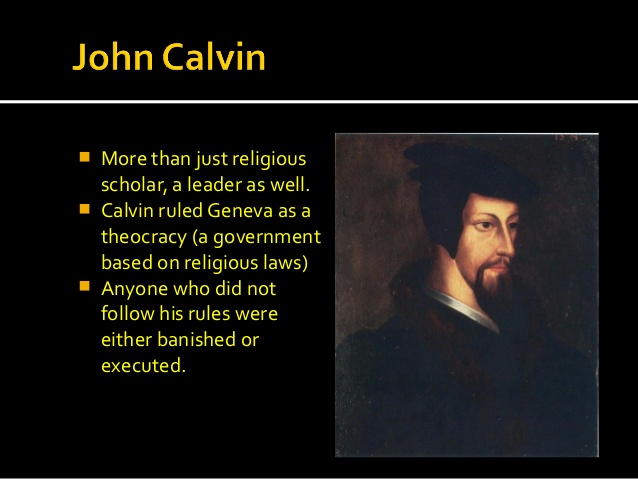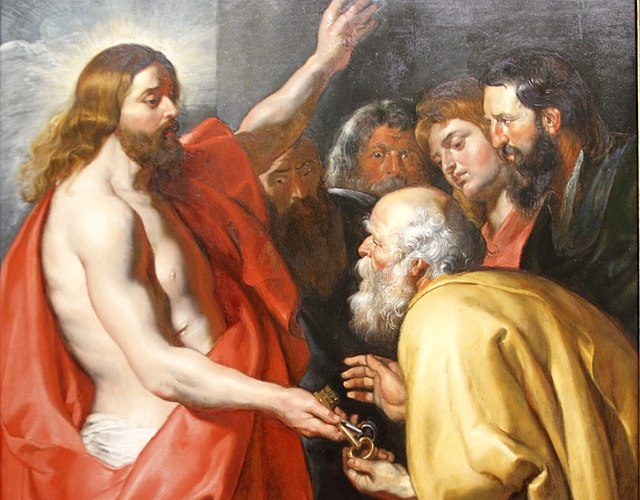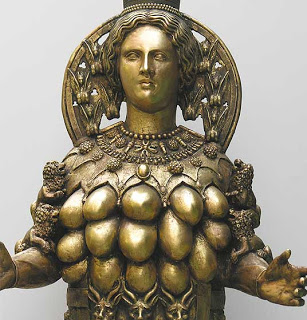It’s important to know the nature of the first Protestants. We have seen how some of Luther’s embarrassing excesses justified polygamy and other carnal sins. Would you buy a used car from John Calvin?
John Calvin was “tonsured as a Catholic priest”. He left The Only Church Jesus Founded and set up his own religious group. In Geneva, a town of maybe 15,000, Calvin had sixty or seventy of its citizens executed for disagreeing with him.
We do not think of him as Calvin, the mass murderer. But, what else can we call a man who repeatedly used his political authority to have his enemies killed? When we compare him to Luther, who first encouraged the peasants to revolt, and then encouraged the nobles to use their professional armies to kill 150,000 of them, Calvin doesn’t seem so bad.
Still, out of a city with a mere 15,000 inhabitants, killing sixty or seventy does put Calvin in the Jim Jones of Jonestown category. At least Jim Jones had the decency to visit the same end on himself that he visited on his followers. Calvin just kept killing until he died a natural death.
If Calvin didn’t kill those who disagreed with him, he made their lives absolutely miserable by endless nit-picking. Following is a list of how obsessive micro-managing was used by schism-inventor Calvin to stay in control. It is a tiresome, but instructive list of top-quality meddling by one of the most self-righteous men who ever lived, John Calvin. Can we help but see him as a mass murderer?
PERSECUTIONS AT CALVIN’S GENEVA: We read these manifestations of self-righteousness closely. They were written down in “The Minutes Book of the Geneva City Council, 1541-59″(translated by Stefan Zweig, Erasmus: The Right to Heresy):
During the ravages of the pestilence in 1545 more than twenty men and women were burnt alive for witchcraft.
From 1542 to 1546 fifty-eight judgements of death and seventy-six decrees of banishment were passed.
During the years 1558 and 1559 the cases of various punishments for all sorts of offenses amounted to four hundred and fourteen.
One burgher smiled while attending a baptism: three days imprisonment.
Another, tired out on a hot summer day, went to sleep during a sermon: prison.
Some workingmen ate pastry at breakfast: three days on bread and water.
Two burghers played skittles: prison.
Two others diced for a quarter bottle of wine: prison.
A blind fiddler played a dance: expelled from the city.
Another praised Castellio’s translation of the Bible: expelled from Geneva.
A girl was caught skating, a widow threw herself on the grave of her husband, a burgher offered his neighbour a pinch of snuff during divine service: they were summoned before the Consistory, exhorted, and ordered to do penance.
Some cheerful fellows at Epiphany stuck a bean into the cake: four-and-twenty hours on bread and water.
A couple of peasants talked about business matters on coming out of church: prison.
A man played cards: he was pilloried with the pack of cards hung around his neck.
Another sang riotously in the street: was told ‘they could go and sing elsewhere,’ this meaning he was banished from the city.
Two bargees had a brawl: executed.
A man who publicly protested against the reformer’s doctrine of predestination was flogged at all the crossways of the city and then expelled.
A book printer who in his cups had railed at Calvin, was sentenced to have his tongue perforated with a red-hot iron before being expelled from the city.
Jacques Gruent was racked and then executed for calling Calvin a hypocrite.
Each offense, even the most paltry, was carefully entered in the record of the Consistory, so that the private life of every citizen could unfailingly be held up against him in evidence.” (See Pike, pp. 61-63).
Sources quoted in Philip Schaff’s “History of the Christian Church, vol. 8” includes:
“The death penalty against heresy, idolatry and blasphemy and barbarous customs of torture were retained. Attendance at public worship was commanded on penalty of three sols. Watchmen were appointed to see that people went to church. The members of the Consistory visited every house once a year to examine the faith and morals of the family. Every unseemly word and act on the street was reported, and the offenders were cited before the Consistory to be either censured and warned, or to be handed over to the Council for severer punishment.”
Several women, among them the wife of Ami Perrin, the captain-general, were imprisoned for dancing.
A man was banished from the city for three months because on hearing an ass bray, he said jestingly ‘He prays a beautiful psalm.’
A young man was punished because he gave his bride a book on housekeeping with the remark: ‘This is the best Psalter.’
Three men who laughed during a sermon were imprisoned for three days.
Three children were punished because they remained outside of the church during the sermon to eat cakes.
A man who swore by the ‘body and blood of Christ’ was fined and condemned to stand for an hour in the pillory on the public square.
A child was whipped for calling his mother a thief and a she-devil.
A girl was beheaded for striking her parents.
A banker was executed for repeated adultery.
A person named Chapuis was imprisoned for four days because he persisted in calling his child Claude (a Roman Catholic saint) instead of Abraham.
Men and women were burnt to death for witchcraft. (See Pike, pp. 55,56).
From Other Sources:
Belot, an Anabaptist was arrested for passing out tracts in Geneva and also accusing Calvin of excessive use of wine. With his books and tracts burned, he was banished from the city and told not to return on pain of hanging (J.L. Adams, The Radical Reformation, pp. 597-598).
What did Martin Luther say about Calvin’s actions in Geneva? “With a death sentence they solve all argumentation” (Juergan L. Neve, A History of Christian Thought, vol. I, p. 285).
“About the month of January 1546, a member of the Little Council, Pierre Ameaux, asserted that Calvin was nothing but a wicked man – who was preaching false doctrine. Calvin felt that his authority as an interpreter of the Word of God was being attacked: he so completely identified his own ministry with the will of God that he considered Ameaux’s words as an insult to the honour of Christ. The Magistrates offered to make the culprit beg Calvin’s pardon on bended knees before the Council of the Two Hundred, but Calvin found this insufficient. On April 8, Ameaux was sentenced to walk all round the town, dressed only in a shirt, bareheaded and carrying a lighted torch in his hand, and after that to present himself before the tribunal and cry to God for mercy” (F. Wendel, Calvin, pp. 85, 86).
These were compiled by Jack Moorman and are available on the internet.
Now, a question arises: Why haven’t such excesses by men like Calvin the mass murderer, become more widely known? Why have most people never heard of them? Who decides which atrocities are announced? Why do we never hear of the 150,000 peasants killed at Luther’s urging? Why do we never hear of the crimes committed by Calvin, the mass murderer?
Would you buy a used car from John Calvin? If you lived in Geneva, yes!









